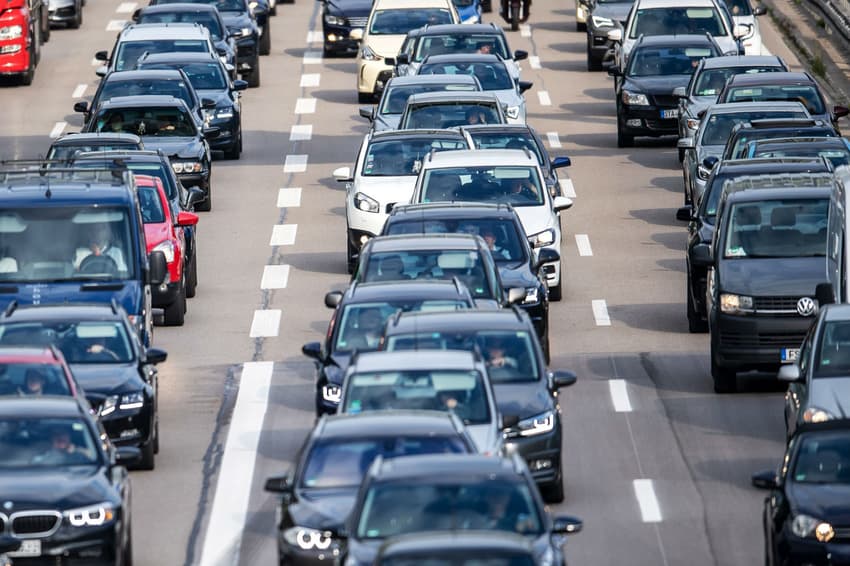German car sales spike as 'dieselgate' effect fades

German car sales enjoyed a strong surge in September, official data showed Wednesday, although the rise was largely attributable to a statistical effect that had weighed on registrations
in late 2018.
Last month, a total 244,622 vehicles hit the roads, 22.2 percent more than
in September 2018, the KBA transport authority said in a statement.
Growth has been more modest over the year to date, adding 2.5 percent to reach 2.74 million vehicles between January and September.
Over that period, "a higher figure was last achieved in the year 2009," the VDA industry federation commented in a statement.
The German data therefore mark a bright spot in an industry battling falling demand worldwide.
Dieselgate woes
Last year in September, German sales had been hit when the European Union
introduced new air pollution tests known as WLTP in response to the "dieselgate" emissions cheating scandal.
READ ALSO: Five things to know about Germany's dieselgate scandal
Some manufacturers encountered bottlenecks in the certification process,
squeezing sales in the autumn months.
The registrations in September 2018 "showed an unusually low level due to
the transition to the WLTP test procedure," the VDA confirmed.
Looking to different manufacturers, giant Volkswagen has so far this year
accounted for 18.2 percent of the German market with sales of almost 500,000
units.
Among the high-end carmakers, BMW booked a 7.4-percent share with sales of
202,500 vehicles, while Mercedes-Benz reached 9.1 percent at almost 250,000
cars and VW subsidiary Audi's market share was 7.8 percent with 214,000.
The dieselgate scandal continues to cast a long shadow, with the share of new cars powered by the fuel just below 30 percent in September.
Petrol cars accounted for almost 60 percent, while electrics reached 2.4 percent and hybrids 7.7 percent.
READ ALSO: Frankfurt car show faces protests over SUVs and climate woes
Comments
See Also
Last month, a total 244,622 vehicles hit the roads, 22.2 percent more than
in September 2018, the KBA transport authority said in a statement.
Growth has been more modest over the year to date, adding 2.5 percent to reach 2.74 million vehicles between January and September.
Over that period, "a higher figure was last achieved in the year 2009," the VDA industry federation commented in a statement.
The German data therefore mark a bright spot in an industry battling falling demand worldwide.
Dieselgate woes
Last year in September, German sales had been hit when the European Union
introduced new air pollution tests known as WLTP in response to the "dieselgate" emissions cheating scandal.
READ ALSO: Five things to know about Germany's dieselgate scandal
Some manufacturers encountered bottlenecks in the certification process,
squeezing sales in the autumn months.
The registrations in September 2018 "showed an unusually low level due to
the transition to the WLTP test procedure," the VDA confirmed.
Looking to different manufacturers, giant Volkswagen has so far this year
accounted for 18.2 percent of the German market with sales of almost 500,000
units.
Among the high-end carmakers, BMW booked a 7.4-percent share with sales of
202,500 vehicles, while Mercedes-Benz reached 9.1 percent at almost 250,000
cars and VW subsidiary Audi's market share was 7.8 percent with 214,000.
The dieselgate scandal continues to cast a long shadow, with the share of new cars powered by the fuel just below 30 percent in September.
Petrol cars accounted for almost 60 percent, while electrics reached 2.4 percent and hybrids 7.7 percent.
READ ALSO: Frankfurt car show faces protests over SUVs and climate woes
Join the conversation in our comments section below. Share your own views and experience and if you have a question or suggestion for our journalists then email us at [email protected].
Please keep comments civil, constructive and on topic – and make sure to read our terms of use before getting involved.
Please log in here to leave a comment.